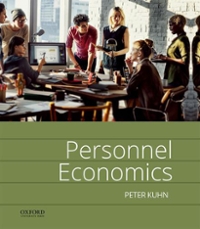4. In our description of the unscrupulous diners dilemma, we argued that a rational self-interested diner will
Question:
4. In our description of the unscrupulous diner’s dilemma, we argued that a rational self-interested diner will order more food if the bill is shared equally than if each person pays for their own meal. This is because the diner sets B'(Fi
) = 1/N in the former case, and B'(Fi
) = 1 in the latter. Using a diagram, show why Fi must be higher when the bill is shared if there are diminishing marginal benefits from food consumption, that is, if B" < 0.
Fantastic news! We've Found the answer you've been seeking!
Step by Step Answer:
Related Book For 

Question Posted:






